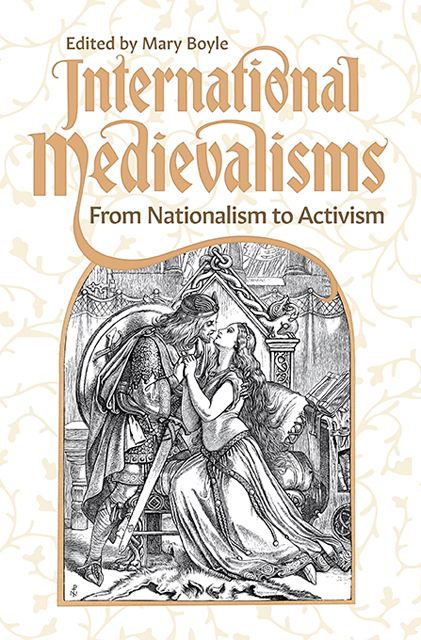Introduction
Published online by Cambridge University Press: 09 June 2023
Summary
International medievalism, at its most basic level, is the juxtaposition of two or more national cultures, at least one of which is medieval. Such a juxtaposition might be by translation, adaptation, or invocation. The term was proposed in 2014 by Louise D’Arcens and Andrew Lynch, and this collection builds on their identifi-cation of international medievalism as ‘a domain of cultural practice in which geo¬graphical, cultural, and temporal demarcations are brought into question … in which epochs are co-present and national cultures are problematised, sometimes even as they are invoked’. Certainly, internationalism is in one sense inherent to medieval¬ism: later political boundaries do not restrict access to the medieval past, though they may inform the nature of engagement with it. But what, in that case, do we mean by terms like national or medieval? Given that the one is frequently employed as part of a strategy to define the other, these central concepts must not be classified too strictly. Medieval should be understood here as nothing more than a broad reference to motifs associated with the cultures and societies of the time period between roughly 410 and 1550, though these dates are themselves subject to debate. While it can include, for example, the adaptation of works produced in this era, medievalism often does not involve a conscious engagement with this timeframe, but with a set of tropes com¬monly recognized as medieval. So-called historical accuracy is not the point. Medieval is therefore much closer to an idea, or a collection of ideas, than anything more histor¬ically specific, and indeed the medieval can often act as a gateway to the invocation of other, even more nebulous, past times. It does, however, frequently carry geographical implications. The receiving cultures discussed within this volume anchor medieval in spatial terms, specifically European, both Western and Eastern. There are, therefore, colonial, political, and cultural implications for the invocation of the medieval when constructed as European in spaces beyond Europe – albeit that ‘Europe’ itself means different things to different people.
Similarly, the term national is not limited to the formal nation state, not least because this construct is a modern invention. Benedict Anderson's classic descrip¬tion of the nation as ‘an imagined political community – and imagined as both inherently limited and sovereign’ is therefore a helpful outline for how national should be understood in this collection.
- Type
- Chapter
- Information
- International MedievalismsFrom Nationalism to Activism, pp. 1 - 16Publisher: Boydell & BrewerPrint publication year: 2023



